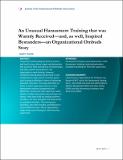| dc.contributor.author | Rowe, Mary | |
| dc.date.accessioned | 2025-06-06T20:35:45Z | |
| dc.date.available | 2025-06-06T20:35:45Z | |
| dc.date.issued | 2025-04 | |
| dc.identifier.uri | https://hdl.handle.net/1721.1/159358 | |
| dc.description | (Note: This article illustrates the importance of training managers and faculty about complaint-handling and about being effective bystanders.) | en_US |
| dc.description.abstract | Harassment and bullying are hard to endure and hard to stop. Many targets and bystanders fear to ask for help, fearing loss of relationships and other painful consequences. All organizations need training. However, sensitivity training about harassment is now unwelcome to many, and it is hard to prove such training is effective in terms of achieving desirable outcomes. This essay describes an effort to teach supervisors how to receive harassment concerns competently and effectively. Faculty and staff supervisors were asked to critique the performance of peers on videos—who were kind but making common mistakes—for their strengths and weaknesses as complaint-handlers. The training was voluntary, very well received, and effective in several different ways. Many organizations might adapt such training for their frontline supervisors. | en_US |
| dc.language.iso | en_US | en_US |
| dc.publisher | Journal of the International Ombuds Association | en_US |
| dc.subject | harassment training, sexual harassment, racial harassment, bullying, inspiring bystanders, complaint-handling for frontline supervisors | en_US |
| dc.title | An Unusual Harassment Training That Was Warmly Received—and, as well, Inspired Bystanders—an Organizational Ombuds Story | en_US |
| dc.type | Article | en_US |
| dc.identifier.citation | Mary Rowe, “An Unusual Harassment Training That Was Warmly Received—and, as well, Inspired Bystanders—an Organizational Ombuds Story," Journal of the International Ombuds Association Vol. 16, No. 2 (Mary Rowe special issue, 2023-2024). | en_US |
